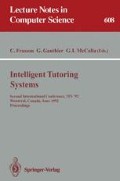Abstract
This paper reports our research work in the new field of human-computer collaborative learning (HCCL). The general architecture of an HCCL is defined. An HCCL system, called People Power, has been implemented in CLOS. It contains a micro-world in which the learner can create an electoral system and simulate elections. The learner's task is to infer relations between the features of the electoral system and the distribution of seats. The human learner collaborates with a computational learner. The collaboration between learners is modelled as ‘socially distributed cognition’ (SDC). We view a pair of learners as a single cognitive agent whose components are distributed over two brains. This model maps inter-people and intra-people communication processes and thereby proposes an explanation of how the former generates the latter: the pattern of arguments that emerge from dialogue is reused by the artificial learner when it reasons alone. Reasoning is implemented as a dialogue with oneself. We report some results of the first experiments we have conducted.
Preview
Unable to display preview. Download preview PDF.
References
BAKER, M. (1992) The collaborative construction of explanations. Paper presented to “Deuxièmes Journées Explication du PRC-GDR-IA du CNRS”, Sophia-Antipolis, June 17–19 1992.
BLAYE, A. (1988) Confrontation socio-cognitive et resolution de problemes. Doctoral dissertation, Centre de Recherche en Psychologie Cognitive, Université de Provence, 13261 Aix-en-Provence, France.
BLAYE, A., LIGHT, P., JOINER, R. & SHELDON, S. (1991) Collaboration as a facilitator of planning and problem solving on a computer based task. British Journal of Psychology, 9, 471–483.
CHAN, T.-W. & Baskin, A.B. (1988) “Studying with the prince”, The computer as a learning companion. Proceedings of the International Conference on Intelligent Tutoring Systems (pp. 194–200), June 1–3. Montreal, Canada.
CLARK, H.H. & BRENNAN S.E. Grounding in Communication. In L. Resnick, J. Levine and S. Teasley. Perspectives on Socially Shared Cognition (pp. 127–149). Hyattsville, MD: American Psychological Association.
DE HAAN, A. & OPPENHUIZEN, C.J. (1990) RITS, cooperative problem solving with computers, a pragmatic approach. Proceedings of the Second ‘Congres Européen Mutli-Media, IA et Formation', September 24–26. Lille, France.
DILLENBOURG, P. (1991) Human-Computer Collaborative Learning. Doctoral dissertation. Department of Computing. University of Lancaster, Lancaster LA14YR, UK.
DOISE, W. & MUGNY, G. (1984) The social development of the intellect. Oxford: Pergamon Press.
DURFEE, E.H., LESSER, V.R. & CORKILL, D.D. (1989) Cooperative Distributed Problem Solving. In A. Barr, P.R. Cohen & E.A. Feigenbaum (Eds) The Handbook of Artificial Intelligence, (Vol. IV, pp. 83–127). Reading, Massachusetts: Addison-Wesley.
HUTCHINS, E. (1991) The Social Organization of Distributed Cognition. In L. Resnick, J. Levine and S. Teasley. Perspectives on Socially Shared Cognition (pp. 383–307). Hyattsville, MD: American Psychological Association.
MINSKY, M (1987) The society of mind. London: William Heinemann Ltd.
MIYAKE, N. (1986) Constructive Interaction and the Iterative Process of Understanding. Cognitive Science, 10, 151–177.
O'MALLEY, C. (1987) Understanding explanation. Paper presented at the third CeRCLe Workshop, Ullswater, UK.
ROSCHELLE J. (to appear) Learning by Collaborating: Convergent Conceptual Change. To appear in the Journal of the Learning Sciences.
SELF, J.A. (1986) The application of machine learning to student modelling. Instructional Science, 14, 327–338.
SELF, J.A. & HARTLEY J.R. (1989) Guided Discovery Learning Systems in Intelligent Computer-Aided Instruction. Final Report of the GDLS project. Department of Computing, University of Lancaster, Lancaster LA1 4YR, UK.
SUCHMAN, L.A. (1987) Plans and Situated Actions. The problem of human-machine communication. Cambridge: Cambridge University Press.
VYGOTSKY, L.S. (1978), Mind in Society. The Development of Higher Psychological Processes. Edited by M. Cole, V. John-Steiner, S. Scribner & E. Souberman Harvard University Press. Cambridge, Massachusetts: Harvard University Press.
WEIZENBAUM, J. (1966) ELIZA: a computer program for the study of natural language communication between man and machine. Communications of the Association for Computing Machinery, 29 (1), pp. 36–45.
WERTSCH, J.V. (1985) Adult-Child Interaction as a Source of Self-Regulation in Children. In S.R. YUSSEN (Ed). The growth of reflection in Children (pp. 69–97). Madison, Wisconsin: Academic Press.
Author information
Authors and Affiliations
Editor information
Rights and permissions
Copyright information
© 1992 Springer-Verlag Berlin Heidelberg
About this paper
Cite this paper
Dillenbourg, P., Self, J.A. (1992). People power: A human-computer collaborative learning system. In: Frasson, C., Gauthier, G., McCalla, G.I. (eds) Intelligent Tutoring Systems. ITS 1992. Lecture Notes in Computer Science, vol 608. Springer, Berlin, Heidelberg. https://doi.org/10.1007/3-540-55606-0_75
Download citation
DOI: https://doi.org/10.1007/3-540-55606-0_75
Published:
Publisher Name: Springer, Berlin, Heidelberg
Print ISBN: 978-3-540-55606-0
Online ISBN: 978-3-540-47254-4
eBook Packages: Springer Book Archive

